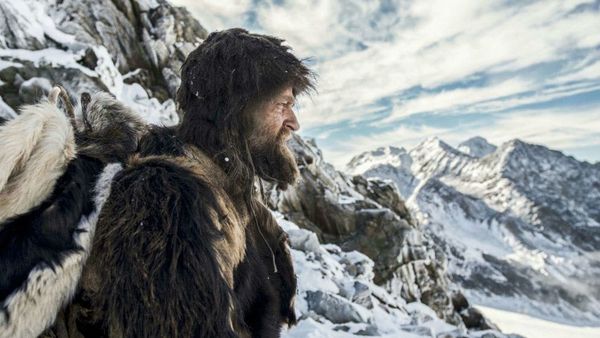Eye For Film >> Movies >> Iceman (2017) Film Review
Iceman
Reviewed by: Emilia Rolewicz

Iceman, inspired by a 5,300-year-old corpse uncovered in 1991, explores an ancient age of severe everyday survival in the Alps against the forces of nature, as well as human nature itself. With only his newborn son left alive after a trio of rambos brutally pillage and burn down his family’s mountainside home, the ‘Iceman,’ Kelab (Jürgen Vogel), has more than survival on his mind. He sets out on a personal pilgrimage, traversing the harsh terrain in order to track down and wreak revenge on this murderous mob.
For all the film’s desire to delve deeply into this long ago time, it does also manage to maintain a mesmerising sense of historical mysticism by not including subtitles for the tribes’ primordial language. However, in general the dialogue is minimal, with an emphasis on capturing life more visually. The wide, sweeping shots of the mountains showcase a world that is both beautiful and deadly; Mother Nature becomes a femme fatale of bitterly icy highland faces and sunrise-lit spaces.

This is bluntly contrasted with the claustrophobia of everyday life inside the sweaty hut of Kelab’s family. While his son plays a tuneful woodwind melody, the camera pans to husband and wife copulating, brazen as cavemen. The duality of this opening captures the film’s juxtaposition of daily survival between the animalistic and the mundane.
Man versus nature is an age old story, but director Felix Randau manages to keep this fresh through breathtaking surroundings and intimately suspenseful moments; imagine if Hitchcock directed Ingmar Bergman’s The Virgin Spring. For instance, at one point Kelab must ice-pick his way up a slope and out of a frozen underground cavern. Every blow of the pick brings you closer to the edge of your seat.
The archaic roots of man versus man are also brought to the fore in a similarly tense way, portraying murder and revenge as a psychological, and not just physical, survival. After Kelab’s family is killed he wastes no time mourning, instead ritualistically salting the corpses and preparing to stalk and defeat his new enemies. This questions what is at the heart of the ‘revenge instinct,’ whether it is something naturally inherent or if it is a nurtured religious need. Either way, Kelab finds difficulty in breaking this cycle. In moments of redemption wherein a family he comes across offers to look after his son while he continues on his quest to kill, he still fails to find hope in the good side of human nature.
Iceman is not just about Kelab’s battle between himself and those who have violently wronged him, but about the external and internal wars between man, nature and nurture. Randau visually soliloquises this in a thrilling, complex and stunning spectacle which will surely be a survivor in the annals of film history.
Reviewed on: 21 Jul 2018

















